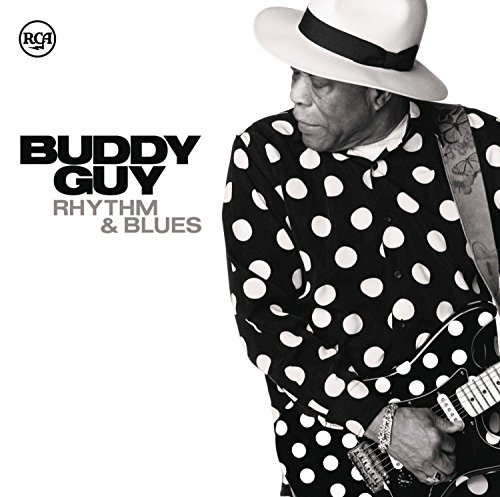
Buddy Guy
Rhythm & Blues
Release Date: Jul 30, 2013
Genre(s): Blues, Modern Electric Blues, Regional Blues, Chicago Blues, Electric Chicago Blues, Modern Electric Chicago Blues, Soul-Blues
Record label: RCA
Music Critic Score
How the Music Critic Score works
Buy Rhythm & Blues from Amazon
Album Review: Rhythm & Blues by Buddy Guy
Fairly Good, Based on 5 Critics
Based on rating 8/10
Buddy Guy's 50-plus-year career has been a testament to a simple premise: playing 12-bar blues as loudly and wildly as possible. It's made him the genre's arch individualist, respected by all and imitated by none. Now, at 76, Guy and a handful of others, such as harmonica player James Cotton, are the last vestiges of Chicago's blues royalty. However, out of all those immortal names, Guy always seemed most comfortable mingling in the rock world, being closer in age to admirers such as Jimi Hendrix, Jeff Beck and Eric Clapton.
Based on rating 7/10
Buddy Guy’s musical integrity is not going anywhere. It is firmly cemented in the earth, as sturdy as Chicago’s oldest buildings. The anxieties that the great blues guitarist experienced at the dawn of the ‘90s, a genuine concern for the future of blues music and how its heritage may get lost, are but a footnote now. If anything, those feelings can be given credit for leading to his late-career revival as Damn Right, I’ve Got the Blues paved the way for some pretty adventurous stuff for a guy who passed 50 a while ago.
Based on rating 6/10
A great open secret of the last act of Buddy Guy's career is that nearly every album he's made in the new millennium is a concept album of sorts, ranging from the gnarled modern Delta blues of Sweet Tea and the acoustic Blues Singer to the pseudo-autobiography of 2010's Living Proof. Rhythm & Blues trumps them all in size and concept: it's a double-disc set divided into one disc of "Rhythm" (aka soul) and one disc of "Blues" (aka blues of the Chicago variety). Several stars come out to help Guy along, top-lined by three-fifths of Aerosmith on "Evil Twin" and Kid Rock on, naturally, "Messin' with the Kid." The former arrives on "Blues" and the latter on "Rhythm," which suggests how fluid the lines are between the two discs.
Based on rating 2.0/5
Buddy Guy, that unceasingly loveable old statesman of the blues, was born for the stage. In the studio, his magnanimity is a liability: Too often he's allowed his raw product to be processed into genre exercises—virtuosic, but canned and glitzed in a manner that obscures the joy and immediacy of his devotion to his craft. The horn charts alone offer scores of teachable moments.
Opinion: Excellent
A shimmery chord wells up amid bird calls and forest rustles to begin “Paracosm” (Sub Pop), the second album by Washed Out, Ernest Greene’s recording project. A paracosm is an imaginary world, and the one that’s conjured by Washed Out floats in a benign haze: “What’s it all about?/The feeling when it all works out,” Mr. Greene sings by way of introduction.
'Rhythm & Blues'
is available now

